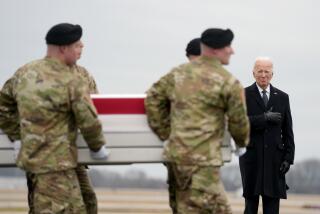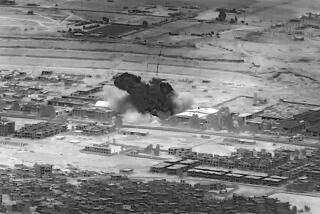Terrorist Plots Foiled Abroad, U.S. Officials Say
- Share via
WASHINGTON — Terrorist plots by Iraqi intelligence aimed at U.S. facilities in two nations, including one on the Arabian Peninsula, have been uncovered recently, the State Department said Friday.
Suspects alleged to have been in the “sleeper cells” were arrested this month in both countries and weapons, including explosives, were confiscated before the attacks could be carried out, U.S. officials said. The arrests led to alerts about potential Iraqi assaults against U.S. interests in at least eight other countries.
The Bush administration refused to identify the Arabian Peninsula nation targeted in the initial plots. But late Friday, the State Department issued a new warning to U.S. citizens in Yemen that the security threat there due to terrorism is now high and urged any Americans considering travel to the country to defer plans.
As a result of “credible reports that terrorists have planned attacks against U.S. interests in Yemen,” the State Department also authorized the voluntary departure of all nonemergency personnel at the U.S. Embassy in Sana, the capital.
The department “anticipates that threats against Americans in Yemen will continue given the increased tensions and security concerns resulting from the current situation in the region,” the warning said.
Yemen, the poorest country on the Arabian Peninsula and one of its most populous, has been a haven in the past for Al Qaeda and Iraqi operatives.
The additional alerts about possible Iraqi operations involve countries in the Middle East, South Asia and Southeast Asia, U.S. officials said.
“There are other locations we’re concerned about. We’re looking more closely, we’re taking action and we’re collecting additional information to add to the hopper,” said a well-placed U.S. official who requested anonymity. “We’re on them. We’re after them.”
In Pakistan, the U.S. Embassy warned Americans on Friday to watch out for possible attacks, including from individuals on the streets, in retaliation for the invasion of Iraq.
“The U.S. Embassy has received evidence of a potential threat to American citizens and other Westerners in Pakistan from terrorists posing as street vendors or beggars on busy streets,” the embassy warned U.S. citizens through its alert system. “Americans are urged to avoid congested areas where these individuals could approach their vehicles.”
This week, Philippine President Gloria Macapagal Arroyo ordered the deportation of two Iraqi Embassy employees in response to a U.S. request. Last month, the Philippines expelled a senior Iraqi envoy for suspected ties to Islamic extremists.
In the run-up to the U.S.-led invasion, the State Department had appealed to about 60 nations to expel diplomats and intelligence agents based in Iraq’s missions abroad. Several nations refused to honor the request. The discoveries disclosed Friday have led the Bush administration to intensify efforts to win support from foreign governments for expulsions.
“Officers in the Iraqi intelligence service remain a threat because of their history of support for terrorism,” said State Department spokesman Richard Boucher. “The United States will continue to monitor this situation and work with our partners and allies to ensure the safety of American citizens and facilities overseas.”
So far, 17 countries have responded to the U.S. request by expelling Iraqi intelligence operatives. In comparison, 19 nations deported Iraqi agents before or during the 1991 Persian Gulf War, the State Department said Friday.
“We’re very encouraged. The business of conducting effective law enforcement is elusive, and targets like Iraqi intelligence require cooperation at various levels. And much of the international community is now helping in keeping track of these guys,” the well-placed official said.
In recent weeks, the U.S. government has pulled nonessential staff from several Middle East embassies and increased diplomatic security.
Shortly after the war began last week, Cofer Black, the State Department’s ambassador at large for counter-terrorism, said the U.S. was worried about attacks by sleeper cells operating at the behest of or in sympathy with Iraq.
“We’re concerned that Iraqi intelligence officers are assuming top authority in Iraqi diplomatic missions overseas and may be instructed to take actions against the U.S. or coalition interests,” Black told lawmakers at a congressional hearing Wednesday.
“We have been urging other countries to expel Iraqi diplomats in order to minimize this threat -- attacks from groups of individuals who have no ties with Iraq or Al Qaeda, but feel strongly enough against the U.S. or the West, [who] believe this is a good time to strike,” Black said.
During the 1991 conflict, Black noted, there were about 200 such incidents. Most were minor, but there were “several major exceptions, conducted primarily by groups or individuals with no known connections with Iraq,” he added.
Iraqi intelligence has not been publicly linked with a terrorist attack since an alleged assassination attempt in 1993 on President George H.W. Bush, the current president’s father, during a visit to Kuwait after he left office.
Administration officials say quiet U.S. counter-terrorism efforts in the intervening years have kept close track of Iraqi intelligence agents.
“Historically we’ve met with success in this area, and the United States and its allies have been devoting significant resources to keep track of their resources and personnel,” the well-placed official said.
*
Times staff writer Josh Meyer contributed to this report.
More to Read
Sign up for Essential California
The most important California stories and recommendations in your inbox every morning.
You may occasionally receive promotional content from the Los Angeles Times.













